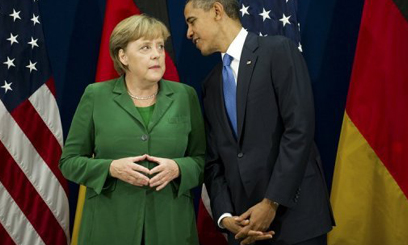Even as Greece dithered over a planned referendum on an EU bailout package for the highly indebted state, China warned that the eurozone crisis will persist and its negative impact expand.
With his job on the line as the Greek parliament takes a confidence vote Friday, Greek Prime Minister George Papandreou said he was ready to drop a plan to put the rescue package to a popular vote which incensed European leaders.
To ringfence the European problem, the world’s biggest economies will also agree at the second and final day of the meeting to bolster the International Monetary Fund’s resources to help tackle the debt crisis.
Non-EU leaders lectured Europe at the opening of the G20 summit, with Russian President Dmitry Medvedev saying: “In my opinion, our partners’ actions need to be much more dynamic and decisive to bring about order.”
US President Barack Obama also said the G20 leaders’ top priority was to conquer the European crisis, which has spooked markets and which Japanese Prime Minister Yoshihiko Noda warned risks provoking a “chain reaction” through the global economy.
“The most important aspect of our task is to resolve the financial crisis here in Europe,” said Obama after meeting summit host French President Nicolas Sarkozy at the start of the meeting in Cannes.
Papandreou triggered a renewed bout of market turmoil this week when he said Athens would put a rescue package agreed only last week to a referendum.
Already on Wednesday, France and Germany had tried to strong-arm Athens into accepting an EU bailout package as the Greek government tottered on the brink of collapse.
Sarkozy and his German counterpart Chancellor Angela Merkel summoned Papandreou to Cannes ahead of the G20 meeting to vent their fury over his high-risk referendum gambit.
They warned Greece would not receive “one more cent” of the International Monetary Fund and EU’s next planned eight-billion euro ($11 billion) aid installment unless he won the referendum scheduled for December 4.
Without the EU-IMF funds, Greece will run out of money within weeks and could face a messy debt default which would force it to leave the European single currency bloc.
Nervous investors sent Italy’s long-term borrowing costs to 6.4 percent, nearing levels unsustainable over the long-term. Stock markets tumbled before being boosted by an unexpected rate cut by the European Central Bank.
The warning seemed to work and Papandreou — back in Athens Thursday and facing a confidence vote in parliament — said he was prepared to drop plans for the referendum which had sent world markets into a tailspin.
However, Merkel kept up the pressure, reiterating the warning it would receive no funds until it approves the rescue package.
“For us, it’s actions that count,” Merkel said. “What’s important is that there is a quick ‘Yes’ to the October 27 decisions.”
China expressed confidence at Europe’s ability to deal with the crisis, but signaled that the trouble would not be resolved quickly.
“There is still a maturing period” before the crisis can be brought under control, said Chinese Commerce Minister Chen Deming.
“So my feeling is that the future impact of this crisis for the world and for Chinese trade will expand,” he added.
Chen said China is confident that “Europe can control this crisis and eliminate it gradually.
“But at the same time, we believe that this will be a long process. There will be an impact on the world economy,” he added.
To dampen the impact, the world’s export powerhouses will pledge to boost their domestic consumption to keep the global economy churning.
“Australia, Brazil, Canada, China, Germany, Korea and Indonesia, where public finances remain relatively strong … agree to take discretionary measures to support domestic demand as appropriate,” said a draft statement debated by the G20.
The G20 will also agree to hike the International Monetary Fund’s resources to help tackle the European debt crisis, officials at the Group of 20 summit said Thursday.
Countries will be allowed to make voluntary contributions to boost the war chest of the IMF, the world’s lender of last resort, said sources close to the negotiations at the G20 meeting in Cannes.
According to a draft of the final statement, the G20 countries also pledge greater exchange rate flexibility, a bitter issue as the United States and Brazil in particular accuse China of keeping its exchange rate artificially low thus skewing global trade.











































